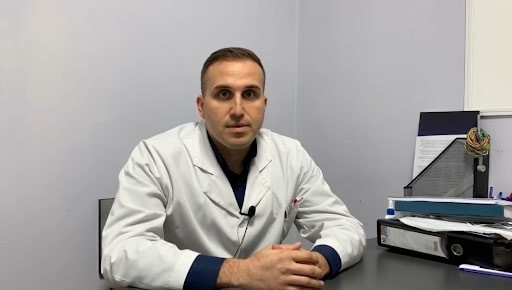Calls for Ukraine
Calls for Europe
Calls for USA

Medtour continues to introduce you to leading doctors and the latest medical
innovations in Ukraine. This time we talked with the spinal neurosurgeon of the
Neurosurgery Center on the basis of the Kiev City Clinical Hospital No. 7,
Vyacheslav Arturovich Gura.
My name is Gura Vyacheslav Arturovich, I am a neurosurgeon. In our clinic, we
offer patients the entire list of neurosurgical care. This includes the treatment of
oncological tumors and degenerative diseases of the spine, such as: herniated disc,
spondylolisthesis, spinal canal stenosis, as well as injuries, spinal fractures.
If we talk about degenerative diseases of the spine, then among them the most
common are herniated discs. The main symptom of this pathology is a pronounced
pain syndrome. If the lumbar spine is affected, the pain may radiate to the leg, if
the cervical one — the pain is usually localized in the arm. There may also be
neurological deficits, such as impaired pelvic organ function, paresis of the foot,
Cauda syndrome (ponytail syndrome) and others.
We have the most modern neurosurgical equipment at our disposal. These are
neuronavigation systems, operating microscopes, a multifunctional operating table
that allows the patient to be positioned in any position necessary for surgical
intervention. In addition, we have microsurgical instruments, a Mayfield brace (a
device that fixes the patient`s head during surgery on the brain or cervical spine).
We perform most of the interventions under an operating microscope, including
the treatment of herniated discs. This makes it possible to significantly reduce the
likelihood of recurrence of the disease, which is often present if surgery is
performed without an operating microscope. Most operations are performed
minimally invasive, which makes it possible to significantly reduce the duration of
the rehabilitation period.
If we talk about the removal of a herniated disc, then patients can already walk
literally 3-4 hours after surgery. We usually send them home the next day. That is,
the need for a patient to stay in a hospital with a herniated disc is only one day. If
we talk about more complex surgical interventions, the period of hospitalization is
up to 5 days. As a rule, patients do not need any specific rehabilitation program.
There are just a number of restrictions on physical activity.
As for the implants, we use high-tech and high-quality materials of foreign
production, for example Medtronic implants (USA). For patients who do not have
the opportunity to pay for the American design, there are more budget options.
These are implants from European manufacturers, which are no worse than
American ones and are more accessible to patients. Before the operation, we give a
person the opportunity to choose an implant, tell them in detail about the features
and advantages of certain models.
I want to note that we perform all operations strictly according to indications. We
are guided by American and European criteria and never prescribe unnecessary
surgical interventions. There are standards that clearly define the expediency of the
operation. Therefore, we honestly inform patients when they really need surgery.
We work closely with Britain. In particular with Henry Marsh. This is a famous
British neurosurgeon. She has done a huge number of operations, among them the
most complex interventions on the brain. He became the founder of microsurgical
operations performed under an operating microscope in Ukraine. In fact, he taught
our domestic neurosurgeons how to perform such surgical interventions. We are in
close cooperation with this doctor: we consult on various issues, send pictures,
hold online conferences. He often comes to visit us in Ukraine.
Taking into account the current situation in the country, if necessary, we conduct
online consultations. This is a full-fledged consultation that allows you to solve all
the main issues concerning the need for surgery, determining its type and degree of
complexity, and the nature of rehabilitation. The patient can send us pictures. We
have the opportunity to watch them online. Through the Zoom program, we can
listen to all the complaints that concern the patient, answer all the questions that
interest him and decide on the appointment of treatment.
As for postoperative complications, as well as the mortality rate, there were no
«accidents» in our practice. Fortunately, all operations are going well.
After discharge, we continue to advise our patients on any issues, in person or in
absentia, as it is convenient for them. We conduct postoperative monitoring,
maintain contact with patients, never abandon anyone and always meet people
halfway.
Please rate the work of MedTour
